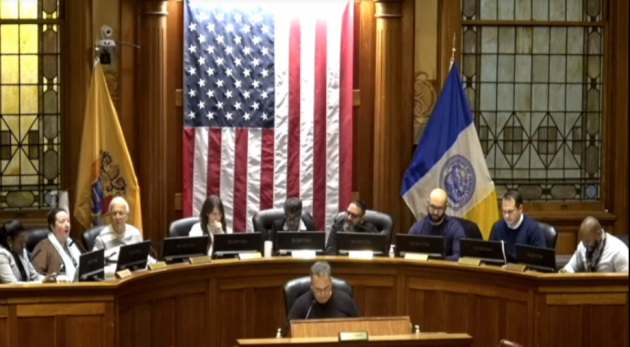The Jersey City Council reviewed the first reading of an ordinance regarding a $288 million effort by the municipal utilities authority to replace all of the city’s lead pipes over the next nine years.

By Daniel Ulloa/Hudson County View
“This ordinance will enable us to uh complete the program as directed by the State of NJ. It’s now federal law. In nine years, all lead pipes must be replaced. It’s going to be a very large program,” JCMUA Executive Director Joe Cunha said during yesterday’s caucus.
The ordinance would allow the JCMUA to perform the work of replacing the service line connecting private property without the express consent of the owner. Owners will be notified well in advance when the work will be done.
“Last year, the mayor instituted this law that all lead … needs to be removed by July of 2031. We’re really gearing up. It’s going to be quite extensive over the next few years. There’s not a water quality issue. It’s really just proactive. We’re trying to identify all service lines in the system. We have a lot of unknowns,” consultant Kate DePippo stated.
She explained they would prioritize disadvantaged communities and places where it’s known the service line or pipes are made of lead first.
“The program is going to be pretty costly. We’re estimating $288 million over the next nine years,” DePippo added, noting they are looking for state and federal dollars to offset the costs.
She also noted that Secaucus-based public relations firm Vision Media would be involved with getting the word out about the endeavor. The program, known as Lead Free JC, was first touted as a 10-year effort to replace the city’s service lines in February.
“What federal funding are you looking for?”, Ward B Councilwoman Mira Prinz-Arey asked.
DePippo said at the moment, they are talking to the NJ Department of Environmental Protection (NJ DEP), as well as the county.
“This needs to be treated as a system-wide project. Nobody will be getting a bill for this directly. We have signs that the federal government, at a minimum … as well as some other grant sources, may be able to give us enough grant funding to make it a net zero,” Cunha added.
“Homeowners will not be billed directly, but there is an indirect charge that all property owners in the city of Jersey City may incur because there would be a rate increase to cover the cost?”, Prinz-Arey questioned.
“Yeah, absolutely. Just like everything else,” Cunha replied.
Ward A Councilwoman Denise Ridley then inquired about how they would determine who has lead pipes or not.
“You’re going to be able to self-certify. Using Suez and possibly other outside contractors, we’re going to be going to homes where we think we have hot spots,” Cunha explained.
“We have so many unknown service lines in the system,” DePippo said.
She said they want to hire locals to identify service lines and will launch a public service campaign. In addition, they have been trying to work with those already doing repairs.
“I’ve lived in the city for 52 years. I don’t know anybody that’s died of lead poisoning. This seems like a total waste of money,” Ward C Councilman Rich Boggiano said.
“It’s mandated by the state,” DePippo responded.
Ward E Councilman James Solomon noted that while lead poisoning typically isn’t fatal, it has a severe impact on children.
“There’s a ton of research on its impact. Kids are the ones most negatively impacted. It reduces IQ. It reduces impulse control. You don’t die of lead poisoning. It just severely harms children,” he said.
“The homeowners are going to bear the burden of this cost. Is there any way we can create a program? The water [bill] has been increasing and increasing and increasing,” Ward F Councilman Frank “Educational” Gilmore noted.
Cunha said the MUA already has a program where someone can apply for a rate payment plan to get reimbursed.
“Someone has a leaky service … after 10 days, we get it done and put it on their bill. Most of the time, we’ve been able to spread that out over five years … They will be reimbursed for $10,000 up to the entire lead service,” he added.
Council President Joyce Watterman pointed out that there is always someone who doesn’t want to participate in a city-sponsored program, so she wanted to know what the plan is in that scenario.
“We’re hoping we don’t have to get to that point. Maybe incentives?”, Cunha answered.
“Newark passed an ordinance that basically removed the owner’s ability to consent to having their lead service line replaced. Is that something you guys would explore?”, Ward D Councilman Yousef Saleh asked.
“We won’t have to only because the governor’s executive order gives us that power. This ordinance basically makes it official the ability to spend money on private property. We’re really not trying to, though,” Cunha said.
Nevertheless, Saleh again questioned if they would use methods similar to what Newark did.
“We want to start addressing pockets of hotspots. The schools are almost none. They’ll be done by the middle of next year,” Cunha explained.
“That was my next question,” Saleh replied.
“Not all the schools, just the ones that were in violation of the 15 parts per billion,” Cunha noted.
Prinz-Arey wanted the MUA to discuss the lead pipe removal in the last group of schools at a separate hearing, a topic that has been on the minds of Jersey City Together and other advocates for quite some time now.
“Are you looking at any other properties besides residential properties?”, Councilwoman-at-Large Amy DeGise asked.
“All properties with lead. The majority of the commercial properties are not subject to lead service line issues,” Cunha replied.
Solomon also questioned the timeline of how this whole situation would play out.
“You’re launching this public relations campaign, you’re asking homeowners to identify the material of their water service pipe and report that back to the MUA. In theory, they could be waiting six months or six years,” Solomon stated.
Cunha reiterated that have prioritized sections of the city most likely vulnerable to the harmful effects.
“Are you going to do outreach in languages other than English?”, Solomon asked.
“Yes,” Cunha replied.
“When did they stop using lead pipes?” Watterman asked.
“It was outlawed in the early 80s,” Cunha responded.
“Wouldn’t it be based on when they built it?”, Watterman questioned, to which Cunha said they have used construction databases to determine properties likely to have lead pipes.
Vision Media Chief Operating Officer Phil Swibinski added that they already have a website and material in English and Spanish.
“We’d like to hear the council’s ideas on resident outreach,” he noted.
Solomon said they should translate it into Arabic, Gujarati, as well as other languages, while Watterman recommended they discuss it with the Department of Health and Human Services.
Additionally, Cunha said the minimum estimate is $2,500 to replace a building’s pipes, though it really varies per bidder.
Due to Thanksgiving on Thursday, the Jersey City Council won’t meet for their regular session until Monday, November 28th, at 6 p.m. The meeting will also stream live on Microsoft Teams.









Bet Ward C residents are mighty proud of how much their councilman cares about them and their kids.